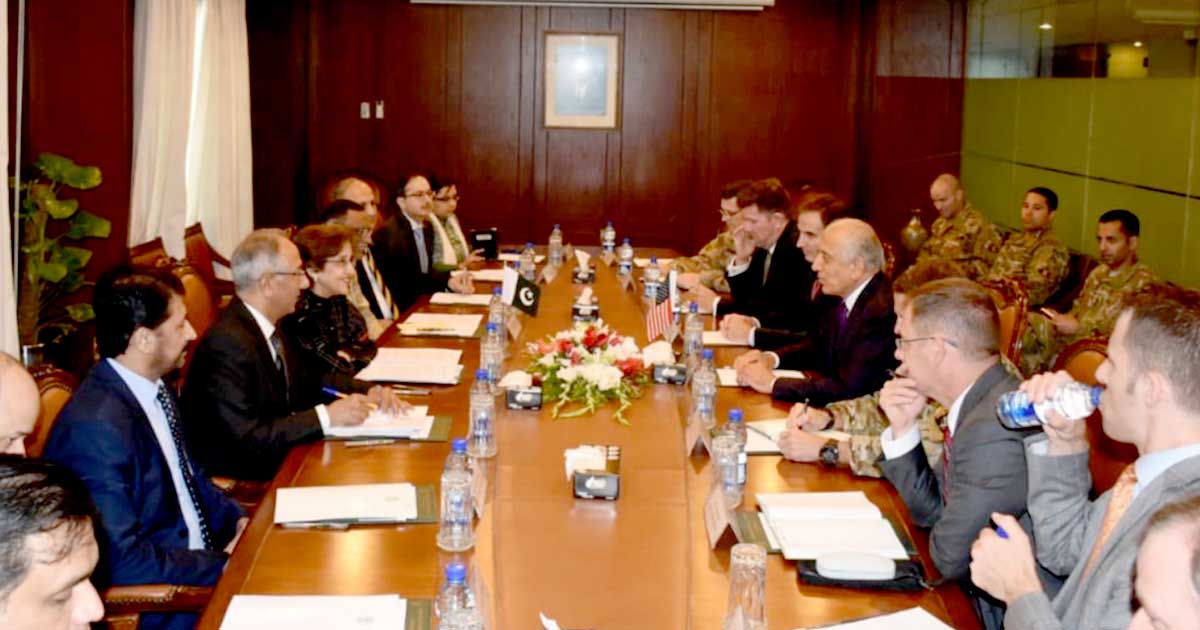News Analysis |
A meeting, held in the Foreign Office Islamabad, between the delegation of the United States of America and Pakistan culminated as both sides agreed that dialogue is the only way forward for long-term peace in the region and it must continue. The U.S delegation comprised of Special Representative for Afghanistan Zalmay Khalilzad and Principal Deputy Assistant Secretary for South and Central Asian Affairs Alice Wells.
On the Pakistan side, Ambassador Aftab Khokher, Additional Secretary (Americas) led the discussion. The cornerstone of the meet up was the ongoing dialogue process between the Taliban and the United States of America. Zalmay Khalilzad expressed hope that it would result in a scenario which will be in the best interest of the Afghan people and regional peace, but for that to happen Taliban must realize the transition since 2001.
America engaged the Taliban in dialogue after the victory was nowhere in sight, with the aim to put a graceful end to the adventure started after 9/11. The negotiations have often come under criticism for their ineptness to incorporate the ruling Kabul regime or representatives of Afghan society in general. But so far, the United States has been able to secure a crucial guarantee from the Taliban that in future the territory of Afghanistan will not be allowed to be used against the USA.
Read more: Freed from Pakistan’s custody: Mullah Baradar to lead Taliban in talks with U.S
However, in return, Taliban have not promised anything which would give the people of Afghanistan anything to rejoice over and hence, the Ghani administration seems to be disgruntled with the progress so far. The disgruntlement was expressed in the statement of Afghanistan National security advisor against the Special Representative for Afghanistan Zalmay Khalilzad.
Taliban Need to Adapt
Khalilzad is right in asserting that for peace to prevail in Afghanistan, it is very important that the Taliban must see Afghanistan differently from the late 90’s when they did were in government. There is a micro and macro perspective on the argument. On a micro level, the Afghan society in the past 18 years has lived under a form of democracy, no matter how fragile or corrupt it may have been.
Therefore, the Taliban need to operate under this system in order to ensure no future civil war starts. Pakistan desperately wants the ongoing negotiations to work in order to have peace in the region and to ensure that no future wave of refugees come to Pakistan; which is a burden that Pakistan’s fragile economy cannot bear in the near future. The macro angle to look at a post-U.S Afghanistan is the security and economic dimension which would polarize the country even more.
Read more: Ambassador Khalilzad & his team hold delegation-level talks in Islamabad: FO
From the security perspective, the rise of ISIS and the ruthless demeanor in their way of committing terror, are alarming for regional countries such as Iran, China, Russia, and Afghanistan. Given importance of the land route through Afghanistan, which would connect China’s trade routes to central Asia leading all the way to Europe, the Taliban needs to be able to protect these international interests.
Return of Alice Wells on the Scene
The Principal Deputy Assistant Secretary for South and Central Asian Affairs Alice Wells was the lady which covertly spearheaded and discussed the contours of formal dialogue with the Taliban. But ever since the United States formally announced Zalmay Khalilzad to take the process forward, she was asked to take the back seat.
Given the current arrangement where the dialogue process seems to have reached a potential deadlock, the Taliban are not willing to accept the Kabul regime as a legitimate stakeholder and are adamantly calling for the U.S to pull out its troops, her return to the scene is understandable.
Read more: Pakistan suspends talks with the US amid mounting tensions
For nearly two years, Alice Wells held secret meetings with the Taliban’s representatives in Doha to discuss how the process would be taken forward once the negotiations are officially started. It is high time to bring the Taliban back to agreed agenda or else the dialogue is doomed.














